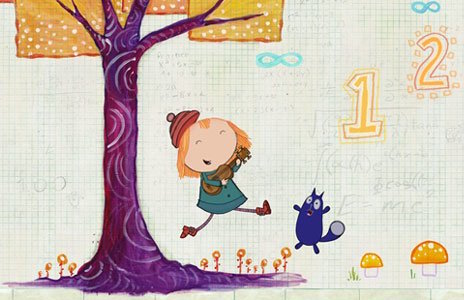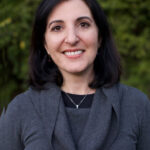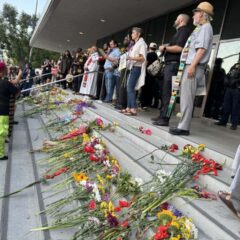This post originally appeared on the Los Angeles Times.
In mid-September, my 6-year-old daughter ran into our living room and literally started jumping for joy. “Baba, it’s a miracle!” she told her father with delight. “‘Peg + Cat’ has an ‘Eid Mubarak’ show. They’re talking about ‘Eid Mubarak’ on TV!”
My husband texted my daughter’s reaction to family members and Muslim friends. When I got the message at work, I felt a moment of happiness and just as quickly a moment of sadness that such a simple event was a novelty for her, and that, at 6, she understood its rarity.
That evening our friends came over and we all watched “Peg + Cat” together — thirty- and fortysomethings riveted by a PBS kids’ show about a girl named Peg who tackles math problems with the help of a sarcastic, self-deprecating cat.
As a parent, I’ve always loved the show. The way it teaches math — story-driven and creative. The way it’s drawn — on graph paper, with whimsical, bright colors. How funny the cat is. But, most of all, I love that the main character is a girl. She’s not the sidekick; she’s the one who identifies the problem and solves it.
This episode was called “The Eid al-Adha Adventure,” and Peg was doing a great job portraying this holiday, which marks the end of the annual hajj pilgrimage. Peg and Cat sang “Eid Mubarak,” or “Happy Holiday” in Arabic, as they explained how Eid al-Adha is about giving to those in need. They figured out how to divide different sized meatballs into equal portions, and then they took the meatballs to a soup kitchen.
But the show’s message went even deeper. Eid al-Adha is a festival of sacrifice, and Cat, at first, didn’t want to give up any of those meatballs. On top of that, charity is intentional. When Peg and Cat discovered that a soup kitchen patron, Mac, had missed his lunch, they took an extra step and sought him out. “So say ‘Eid Mubarak’ on each and every day,” Peg, Cat and Mac sang, “You’ll never solve a problem if you look the other way.”
The adults were as gratified by Peg and Cat’s adventure as my daughter was. One friend was almost in tears. I couldn’t stop smiling. It was a sweet, simple expression of what Eid al-Adha means to us, on kids’ TV, as a matter of course. Such a moment of complete cultural acceptance is something Muslims don’t experience too often these days.
And it was short-lived. That evening, a bomb was detonated in New York City. The next day, police captured a man with a Muslim name. And, once again, we felt a heavy, familiar mixture of frustration, anger and fear.
This year’s election has been something of a referendum on our faith, on my people. I am the daughter of Syrian immigrants, though, unlike the many refugees who are leaving Syria now, my parents came on much more pleasant terms.
Still, I learned to carry the weight of world affairs when I was growing up. My generation of American-born Muslims defined ourselves in the shadow of the Iranian hostage crisis (I was 5). Then came the downing of Pan Am Flight 103 over Scotland, the fatwa issued by the Ayatollah Khomeini against Salman Rushdie for his book “The Satanic Verses,” and the bombing of Marine barracks in Lebanon. I was keenly aware of all of these events. I knew that the word “Islam” was being used to describe them.
Now my daughter’s generation has an even more difficult path ahead. Many Americans want a diverse, multiethnic, multireligious country. But others are threatened by the country’s changing demographics. The level of anti-Muslim rhetoric and violence today is unprecedented. A 2015 YouGov/Huffington Post poll found that 55% of Americans hold an unfavorable view of Muslims.
I grew up attending the Islamic Center of Southern California, a mosque in Los Angeles that was unapologetically Muslim and American. Surrounding mosques called us sellouts because we didn’t believe in segregating the sexes. Our leaders promoted a distinctly American Muslim identity. We were taught that we had the best of many worlds at our disposal, and we were raised to stand up for justice, help the needy, build understanding and make our country — the United States — as great as it could be.
This is the Islam and the America I believe in. This is the Islam and the America that “Peg + Cat” modeled. And this is what I try to pass on to my daughter.
It’s not easy. How do I explain to her that just this week police arrested a man for stockpiling weapons and threatening the very same mosque that I grew up in? I know it’s only a matter of time before hard truths shatter her innocence. And yet it’s my job to make sure my daughter sees a bright future for herself.
For now, I’m just happy that “Peg + Cat” is helping out.
Photo by Wikimedia Commons.
Rhonda Roumani is a contributing fellow with the USC Center for Religion and Civic Culture and a journalist fellow with the Spiritual Exemplars Project.





